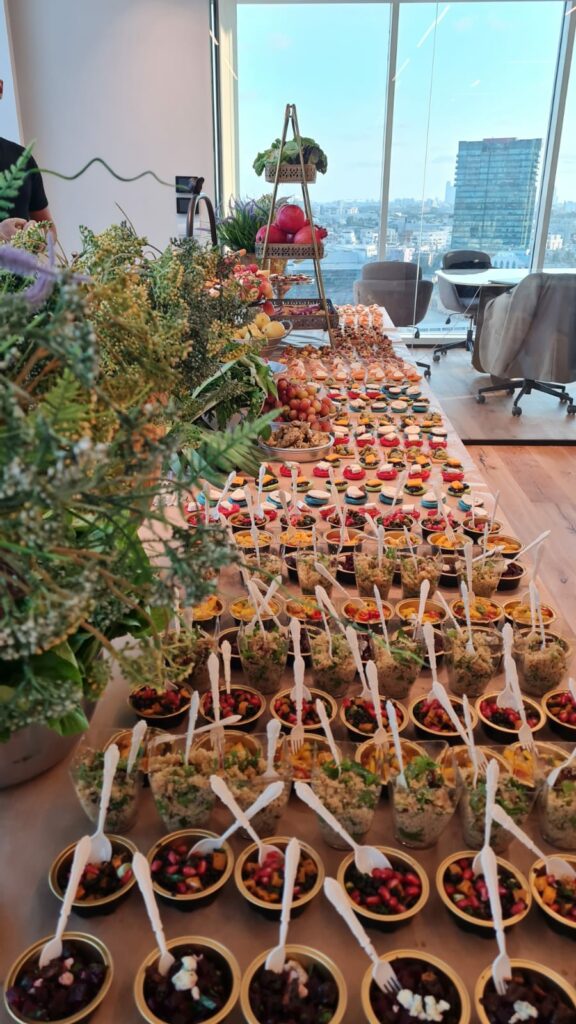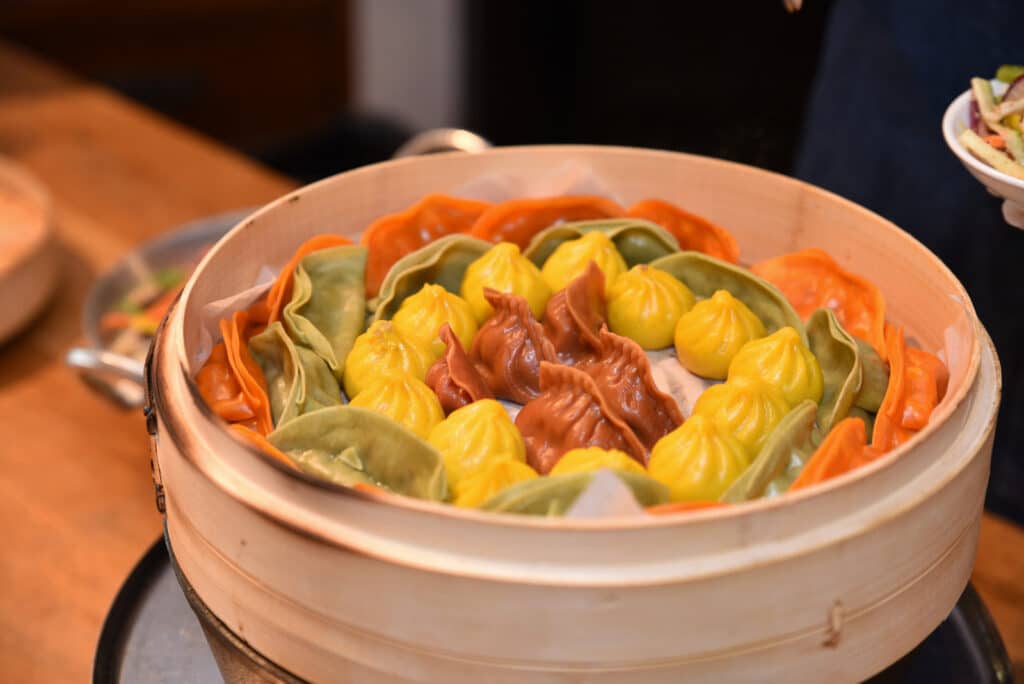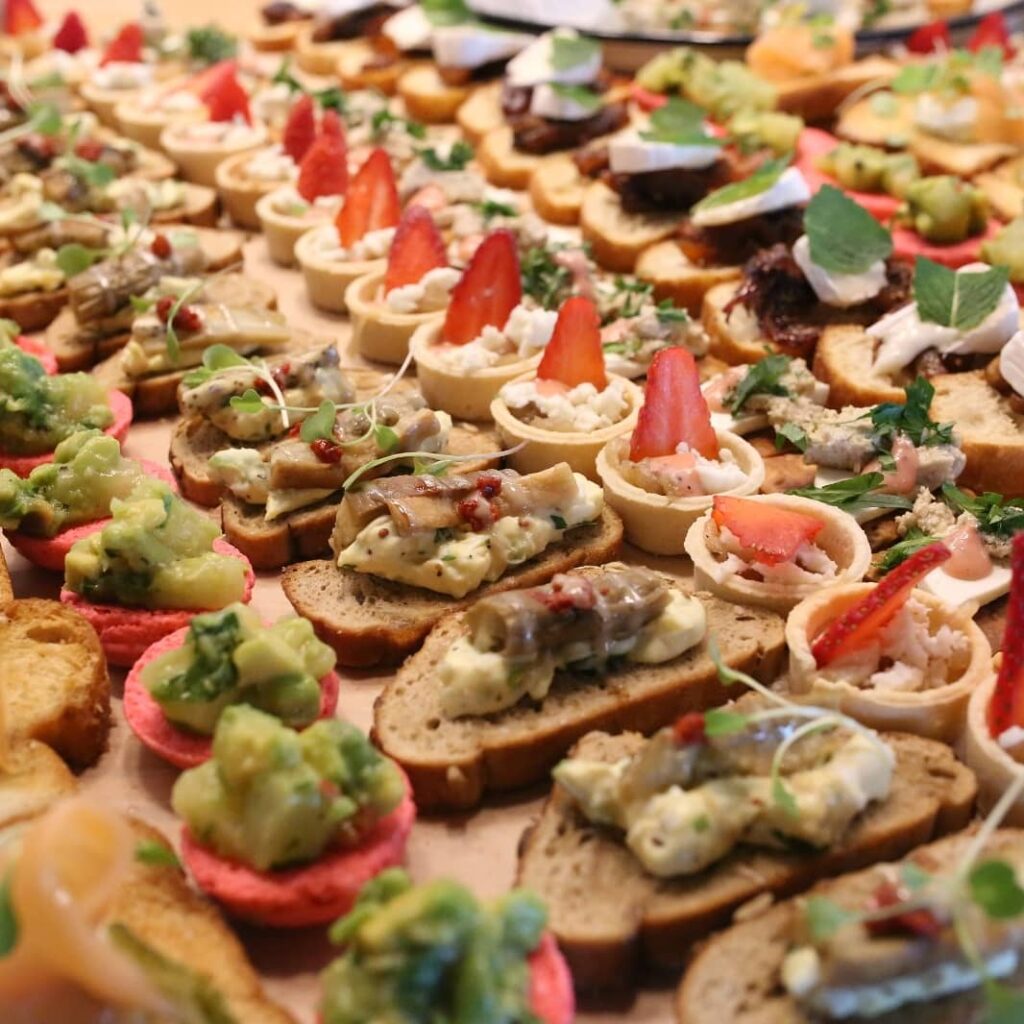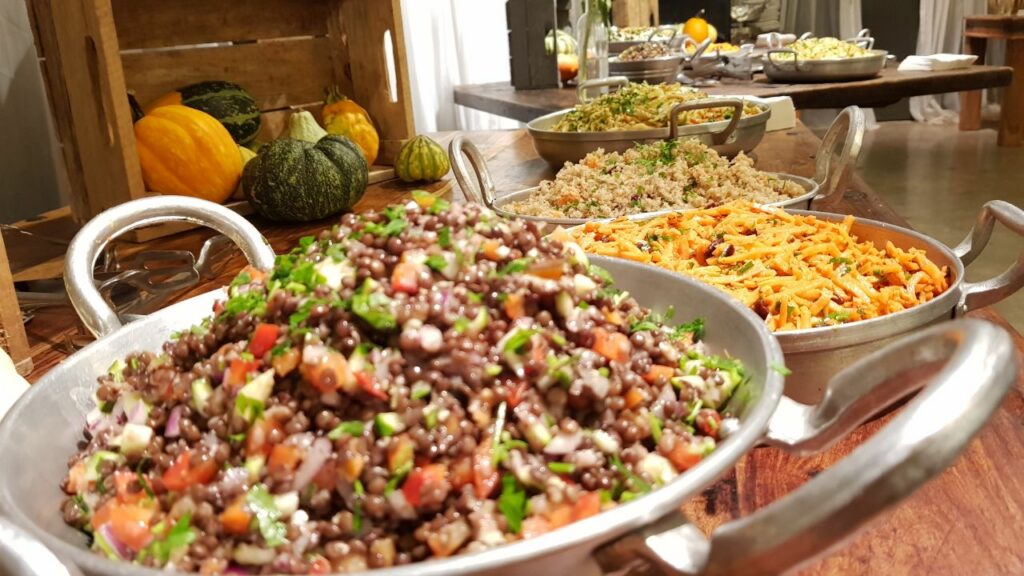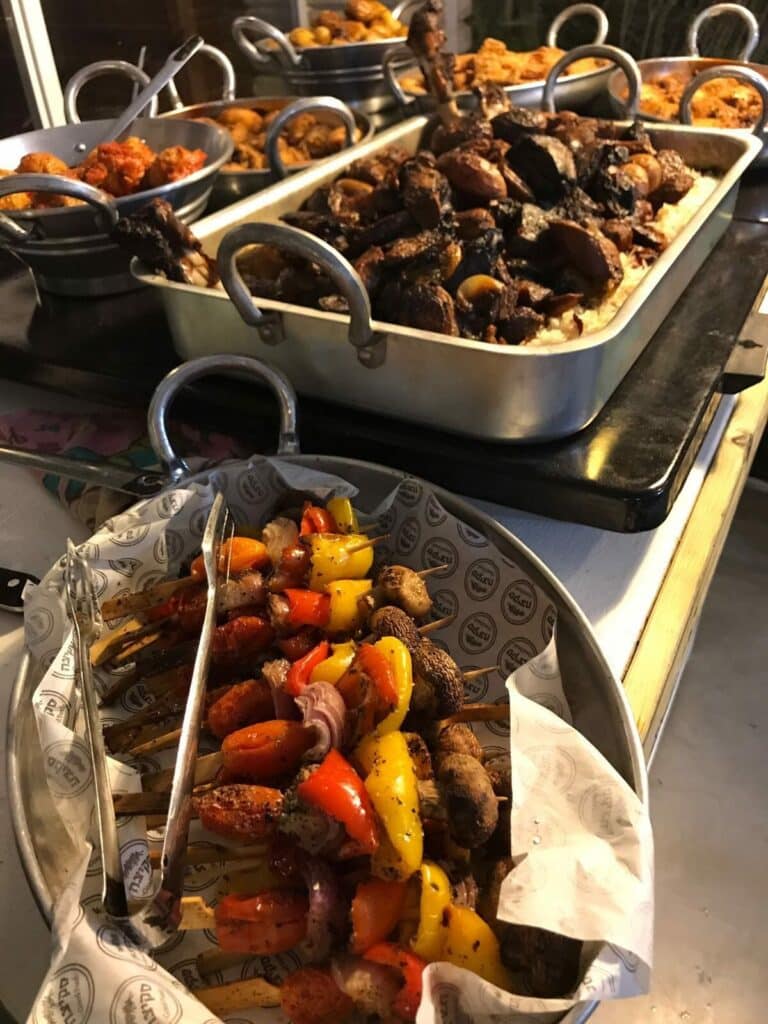When it comes to catering for special events, the importance of taking into consideration everyone’s dietary needs cannot be overstated. For many people, and especially those who observe Halal or Kosher dietary laws, this means finding caterers who understand their requirements and can provide a meal that is both delicious and compliant with their faith. In Yehud, a city in Israel known for its diverse population, catering for Hina is an essential part of hosting any event.
Whether it's a wedding reception or a business function, finding quality caterers who understand the specific requirements of Hina can be difficult. Not only must they be able to provide dishes that are halal-compliant but they must also be creative in their approach and able to create unique dishes that will please even the most discerning guests. Fortunately, there are several excellent caterers in Yehud who have both the knowledge and experience necessary to ensure your event is a success.
In this article we'll take a look at what exactly Hina catering entails and explore some of the best caterers in Yehud who specialize in providing delicious meals that meet the exacting standards of those observing Hina laws. Whether you're looking for something traditional or something more unusual, these experienced professionals have you covered. So don't delay – read on to find out more about how you can make sure your next event is one to remember!
Traditional Hina Cuisine
A feast fit for a queen. That's what Hina deserves, and that's exactly what we'll give her. Through the flavors of traditional Hina cuisine, we can create a memorable evening of joy and satisfaction.
The exciting array of spices and flavors found in traditional Hina cuisine make it the perfect choice for this special occasion. From savory soups to delicious desserts, every dish will be full of flavor and texture. We'll use herbs and spices like cardamom and saffron to add complexity to the dishes. To make sure each course is as unique as it is delicious, we'll incorporate local produce such as dates, figs, olives, and lemons into the recipes.
With our menu set, it's time to start shopping for all the ingredients we need to bring our vision of a traditional Hina feast to life. As we search through markets for fresh produce and fragrant spices, we'll take care to ensure our selections are of the highest quality so that every dish is prepared with love — just like Hina deserves!
Shopping For The Ingredients
What an interesting coincidence it is that shopping for the ingredients for a traditional Hina meal requires almost as much thought, effort and consideration as preparing the meal itself. Indeed, when catering for Hina in Yehud, there are several key elements to consider when stocking up on supplies:
• Grocery Shopping: This involves looking beyond the basics of flour, sugar and eggs to purchase specific spices, condiments and other ingredients which have a special place in traditional Hina cuisine. • Produce Shopping: Finding the right produce for dishes such as mashed potatoes or sweet potatoes can be tricky due to the availability of different varieties. • Meat Shopping: In addition to selecting fresh cuts of meat from butcher shops, you should also make sure to ask about any special cuts that are used specifically in Hina dishes.
These three aspects of shopping for ingredients need to be taken seriously if you want your meal to taste authentic. And by being aware of what kind of food is necessary, you can make sure that you don't miss out on anything essential while stocking up on supplies. With this knowledge in hand, you're now ready to move on to the next step – preparing for the meal.
Preparing For The Meal
Preparing for the meal is a crucial part of hosting any event, especially when catering for Hina. It involves careful planning and creating a menu that reflects all the traditions and customs associated with the special day. As such, there are a few steps to consider:
Analyzing the guest list: Identifying who will be attending and what their preferences are in terms of cuisine, dietary restrictions, and religious observances.
Developing a menu: This includes selecting recipes that are suitable for those attending, taking into account any allergies or special requests.
Preparing the food: Gathering all necessary ingredients and equipment beforehand to ensure everything runs smoothly on the day.
Ultimately, successful preparation is key to ensuring that everyone enjoys their experience on this important occasion. By taking these measures into account, hosts can make sure they have created an unforgettable event that reflects the cultural significance of Hina.
Recipes For Hina Dishes
When catering for Hina in Yehud, the next step is to decide what recipes to make. This requires careful thought and consideration, as there are a variety of traditional dishes that can be made. After all, it's important to make sure that everyone attending the event enjoys the food.
The most popular Hina dishes include couscous, stuffed vegetables, and pastillas. These dishes are often served as part of a larger buffet-style meal or presented in individual servings. It's important to also think about whether you will use fresh or canned ingredients when preparing these dishes.
In addition to the main courses, it's also important to plan out any side dishes that will be served at the event. Traditional sides for Hina include salads, breads, and sauces. All of these can be made from scratch or purchased pre-made from specialty stores.
Regardless of what recipes are chosen for Hina catering in Yehud, it is important to ensure that all guests are satisfied with their meals. With a proper plan in place and tasty recipes on hand, serving up delicious Hina food is sure to be a success!
Serving Hina Food In Yehud
It's almost too good to be true – the perfect occasion and the perfect place for it. You have decided to cater for a celebration in Yehud and you want to serve Hina dishes. What could be better?
Now that the decision has been made, let's look into how best to serve the Hina food at this event. It is important that all guests feel welcomed and enjoy the traditional flavors of Hina cuisine.
Presentation can play an important role when it comes to catering for a special occasion. Think about how each dish should be served, keeping in mind local customs and cultural considerations. Make sure to use appropriate utensils and decorations, as well as adding a personal touch with some creative presentation ideas. With careful planning, you can ensure your guests have an unforgettable experience enjoying delicious Hina food.
Cultural Considerations When Catering
Catering for an event in Yehud is more than just the food. Cultural considerations must be taken into account when planning a menu, as well as understanding the customs of those attending. It's important to ensure everyone feels included and respected, regardless of their background.
When putting together a menu for an event in Yehud, it's important to consider cultural differences. It's best to ask guests ahead of time if there are any dietary restrictions or preferences they may have due to religious or cultural reasons. For example, many people from Yehud follow a kosher diet and avoid certain foods such as pork and shellfish. Depending on the type of event, you may also want to consider whether guests would prefer traditional dishes from their culture over international cuisine.
It's also important to think about how you present the food itself at a catered event in Yehud. Traditional dishes may be presented differently compared to how they are served at home – for example, plating individual servings rather than family-style dishes – so be sure to communicate with your caterer and guests before deciding on a menu.
Taking all these things into account will help ensure that everyone feels welcome and comfortable at your event in Yehud. With this knowledge in mind, utensils and table settings can be chosen accordingly to create the perfect atmosphere.
Utensils And Table Settings
When it comes to hosting a hina event in Yehud, utensils and table settings can be just as important as cultural considerations. A survey conducted by the Israel Tourism Ministry found that over 70% of guests surveyed felt that tableware and seating arrangements said a lot about the host's hospitality.
It is important to remember that Yehud is a multi-cultural society and thus should be respected when selecting table settings. Utensils should always be appropriate for the type of food being served. For example, if traditional Israeli dishes are on the menu, then Israeli style cutlery should be used. Additionally, any special dietary requirements such as vegetarian or gluten free meals must also be kept in mind when choosing tableware.
Table seating should also reflect the culture of Yehud. Traditional Jewish celebrations involve a lot of ritual which requires specific seating arrangements around the dinner table for each guest. To ensure that all guests are comfortable, chairs should be placed in an orderly fashion with enough space between them for everyone to move freely.
By taking into account both cultural factors and practical considerations when selecting utensils and table settings, hosts can make sure their hina event in Yehud is one to remember! With this in mind, it's time to explore how best to host a hina event in Yehud…
Hosting A Hina Event
Hosting a hina event is an art. It requires finesse, patience and attention to detail, in order to create an atmosphere that will be remembered for years to come. When catering for hina in Yehud, all of these elements must be taken into consideration. From the set-up of the tables to the decorations and presentation, setting the scene for a successful event is essential.
To begin with, it's important to make sure that your guests are comfortable and can enjoy their meal without any hassle. This means providing enough utensils, table settings and seating arrangements that match the occasion. Additionally, having adequate space for everyone to move around without crowding each other is also key. Finally, having a well-stocked kitchen or buffet table full of delicious food and drinks is a must – consider hiring caterers if necessary.
Once everything is ready, it's time to focus on presentation and decorations – making sure they reflect the theme of your hina event perfectly. Think about interesting centrepieces or lighting designs that will add colour and sparkle. Incorporating traditional elements such as paper lanterns or fabrics with bright patterns can also be fun – just make sure not to go overboard! With careful planning and thoughtfulness, you can create an unforgettable experience for all your guests – one that they'll cherish forever.
Presentation And Decorations
Presentation and decorations are an important part of any hina event. The atmosphere of the event should be inviting and reflect its purpose. To do this, consider the colors, fabric, and overall look of the decorations that will be used.
Think about how to best represent the spirit of hina in the decorations. If you are hosting a dinner or other gathering, use tablecloths and place settings that create a warm and welcoming atmosphere. Decorate with items such as candles or flowers to add a festive feel for your guests.
Creating an appropriate backdrop for presentations or performances is also essential. Consider adding special touches like colorful draping fabric or lighting to enhance the ambiance of your event.
TIP: Have fun with it! Don't be afraid to add unique touches like streamers or flags to really make your event stand out from the crowd. Use creative ideas to add interest to your decorations and ensure that each element has its own special place in your celebration!
Cleanup And Disposal
Cleanup and disposal is an important part of any catering event. It requires careful planning and coordination to ensure that all guests are safe and the environment is protected.
First, all surfaces must be disinfected. This includes countertops, tables, and chairs. Any dishes or utensils used during the event should be properly washed, dried, and stored away in a designated area.
Second, all leftover food needs to be disposed of properly. The food should be separated into biodegradable containers for composting and non-biodegradable containers for recycling. This helps reduce waste and keep the environment clean.
Thirdly, all decorations need to be removed and disposed of in the appropriate way. This may include disposing of balloons in a safe manner or taking down banners and streamers in a way that won't damage them for future use. Here are four tips for successful cleanup:
- Start early – plan ahead to make sure everything is taken care of on time.
- Have enough help – delegate tasks to ensure everyone pitches in to help with cleanup quickly and efficiently.
- Use proper safety protocols – wear gloves while handling garbage or cleaning surfaces to avoid contamination.
- Dispose responsibly – separate materials into designated bins for recycling and composting as much as possible.
By following these steps when it comes to cleanup and disposal, caterers can ensure their events run smoothly while protecting their guests and the environment at the same time.
Conclusion
Hina meals are a great way to honor and celebrate special events in the Jewish community of Yehud. By following the steps outlined above, you can create a delicious and meaningful Hina meal that will be remembered for years to come.
From shopping for ingredients to setting the table, catering for Hina in Yehud is an art form of its own. The details of the presentation, decorations, and utensils can help set the tone for an enjoyable and memorable event. Every effort should be made to ensure that each guest feels welcomed and appreciated.
At the end of the day, catering for Hina in Yehud is all about creating a unique experience that celebrates Jewish culture while bringing people together over a delicious meal. With careful planning and preparation, your Hina dinner will be one to remember!
- 1. Traditional Hina Cuisine
- 2. Shopping For The Ingredients
- 3. Preparing For The Meal
- 4. Recipes For Hina Dishes
- 5. Serving Hina Food In Yehud
- 6. Cultural Considerations When Catering
- 7. Utensils And Table Settings
- 8. Hosting A Hina Event
- 9. Presentation And Decorations
- 10. Cleanup And Disposal
- 11. Conclusion





